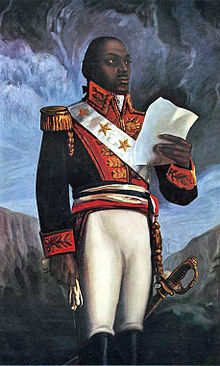Portal:Pan-Africanism/Selected biography/11
Toussaint Louverture | |
|---|---|
 Posthumous painting of Toussaint Louverture | |
| President of Haiti | |
| In office 7 July 1801 – 6 May 1802 | |
| Appointed by | Constitution of 1801 |
| Preceded by | Inaugural holder |
| Succeeded by | Jean-Jacques Dessalines (Republic of Haiti) |
| Governor-General of Saint-Domingue | |
| In office 1797–1801 | |
| Appointed by | Étienne Maynaud |
| Preceded by | Inaugural holder |
| Succeeded by | Position abolished |
| Personal details | |
| Born | Toussaint Bréda 20 May 1743 Saint-Domingue (now Haiti) |
| Died | 7 April 1803 (aged 59) Fort-de-Joux, France |
| Nickname(s) | Napoléon Noir Black Spartacus |
| Military career | |
| Allegiance | |
| Service | French Army French Revolutionary Army Armée Indigène |
| Rank | General |
| Battles / wars | Haitian Revolution |
François-Dominique Toussaint Louverture (French: [fʁɑ̃swa dɔminik tusɛ̃ luvɛʁtyʁ] 9 May 1743 – 7 April 1803), also known as Toussaint L'Ouverture or Toussaint Bréda, was the best-known leader of the Haitian Revolution. He was a leader of the growing resistance. His military and political acumen saved the gains of the first Black insurrection in November 1791. He first fought for the Spanish against the French; then for France against Spain and Great Britain; and finally, for Saint-Domingue against Napoleonic France. He then helped transform the insurgency into a revolutionary movement, which by 1800 had turned Saint-Domingue, the most prosperous slave colony of the time, into the first free colonial society to have explicitly rejected race as the basis of social ranking.
Though Louverture did not sever ties with France, his actions in 1800 constituted a de facto autonomous colony. The colony's constitution proclaimed him governor for life even against Napoleon Bonaparte's wishes. He died betrayed before the final and most violent stage of the armed conflict. However, his achievements set the grounds for the Black army's absolute victory and for Jean-Jacques Dessalines to declare the sovereign state of Haiti in January 1804. Louverture's prominent role in the Haitian success over colonialism and slavery had earned him the admiration of friends and detractors alike.